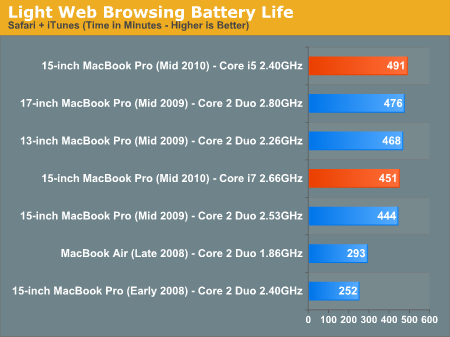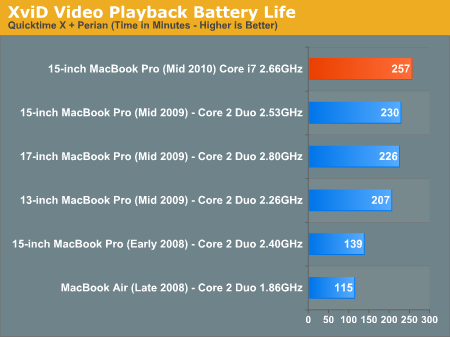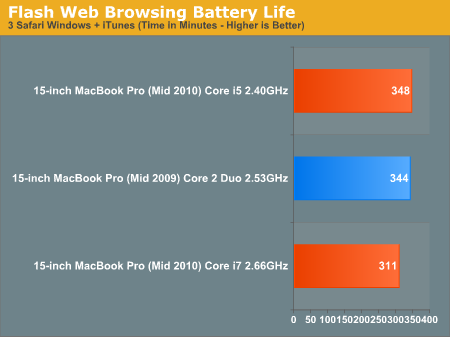Apple's 15-inch 2010 MacBook Pro: More Battery Life Tests, High Res Display Evaluated
by Anand Lal Shimpi on April 24, 2010 1:57 AM EST- Posted in
- Mac
- Displays
- MacBook Pro
- Arrandale
- Laptops
Core i5 vs. Core i7 Battery Life
With access to the top-of-the-line Core i7 MacBook Pro, I decided to run comparative battery life tests between it and the entry level Core i5 system. The main difference is a higher clocked CPU and an extra MB of L3 cache. The i7 ends up being up to 15% faster than the i5, but at what detriment to battery life.
The results below echo what I’ve seen in real world usage. You generally lose a little under 10% battery life when you opt for the Core i7 MacBook Pro vs. the entry level Core i5. You do gain more than that in performance, a noticeable increase in my opinion, but if you value battery life more than performance you’re better off with the i5. If you're upgrading from the previous generation, you may actually see a real reduction in battery life depending on your workload if you go to the i7. Update: The Core i7 model we're testing also uses the high res display, which should consume more power than the low res standard display. The difference in battery life isn't just due to the CPUs but the display as well.


Note that your mileage may vary considerably here. Years ago Intel started shipping its processor families with a range of core voltage options. Two 2.66GHz Core i7s may run at wildly different core voltages, which would ultimately impact battery life. It’s possible that I got a particularly bad Core i7 (or particularly good Core i5) and that you’ll see a different gap than I did.
I also ran the i7 system in the rest of our Apple battery life suite.
XviD Video Playback
I ripped The Dark Knight to XviD and played it back continuously in QuickTime X with Perian installed. For this test the display was set to full brightess and audio was set at two bars below maximum. Once more the hard drive was allowed to go to sleep if it was idle. The AirPort (wireless LAN) was enabled and connected to a local access point less than 20 feet away.
XviD playback actually demonstrates our largest improvement in battery life over the previous generation. If you've got a MacBook Pro from just two years ago you'll have roughly twice the battery life with a new one.

Flash Web Browsing
The test here has three Safari windows open, each browsing a set of web pages with between 1 - 4 animated flash ads per page, at the same time. Each page forwards onto the next after about 20 seconds.
As always, the display is set to 50% brightness, audio at two bars, screensaver disabled and the hard drive is allowed to go to sleep if idle. The wireless connection is enabled and connected to a local access point less than 20 feet away.

Heavy flash web browsing is effectively no better on the new MacBook Pro compared to the old one. If you opt for the Core i7, you'll actually take a hit compared to the older MacBook Pro. You might be wondering why we don't have more historical data for our Flash web browsing battery life test. I'm glad you asked...










69 Comments
View All Comments
Anand Lal Shimpi - Saturday, April 24, 2010 - link
Thank you!Take care,
Anand
BanditWorks - Saturday, April 24, 2010 - link
I don't have the new MacBook Pros, but I do have a year old regular MacBook and while I was giving the new Adobe Flash 10.1 beta (the one that utilizes the GPU and CPU) I definitely saw a noticeable difference in battery life.As I wasn't doing anything that intensive on my MacBook I went back to the most stable version of Flash and it felt as if I had installed a newer, longer lasting battery instantaneously.
PS - Yeah, glossy screens suck big time. They're as tacky as a car with everything chromed out. They may be nice to look at when the screen is turned off, but for everything else they don't really serve much of a purpose in my opinion.
Computer Scooter Joe - Saturday, April 24, 2010 - link
Anand,You mentioned under windows the dGPU will always be on. In regards to this i have two questions:
1) Are there any heat issues with the dGPU being on all the time? Does the laptop get especially hot?
2) Do you foresee being able to enable graphics switching under windows? (Be it via Apple or a hack/3rd-party program)
I'm going to be attending University in the fall and i really like the aesthetics of the Macbook Pros; but these two questions have me a little worried. Having tried it, I must admit, I really do not like OSX at all (yes i know, blasphemy and all that), and i plan on bootcamping Windows 7. Price is not an issue; performance (or lack thereof) is what matters.
PS: To other commenters, please do not flame and start saying "Go buy Laptop X from this other company, Mac's are overpriced."
Thanks in advance.
Brian Klug - Saturday, April 24, 2010 - link
I can't speak entirely for the dGPU temperature in Windows 7 or boot camp installed OSes, but I do think I can talk a little about the dGPU temperature because I find myself switched on it a lot for what I do.I run a lot of Matlab related software on OS X (as I'm also a student), which requires an X11 instance. It seems that the X11 window system on OS X inevitably calls one of those core libraries that triggers the discrete GPU switching, and usually I don't notice until a good hour or so later that I'm on the dGPU. You'll notice that the battery life estimate changes. It doesn't immediately dramatically suffer, but it just seems shorter. Temperature creeps up a bit, but in practice for what I'm doing being switched on the dGPU doesn't raise internal temperatures more than 15 degrees F. I'd imagine playing games or doing some heavy OpenGL loads would change that though.
Apple has done a pretty good job with the thermal management from what I've seen thus far. I've had a couple of eyebrow-raising moments burning in the matte MBP I used for the display review section, but it's important to understand that temps up to 200F (while admittedly INSANE IMO) are well within the T_junction spec from the i7 spec sheet. The CPU will throttle long before you do any physical damage.
-Brian Klug
solipsism - Saturday, April 24, 2010 - link
Thanks for the review.I know that there is a Sys Pref option to keep the dGPU on all the time, but there is no power saving option to disable the dGPU completely. Did you find a secret switch, like in an PLIST file that will allow this to happen. This would come in handy for long bouts without a power cord attached.
etikka - Saturday, April 24, 2010 - link
Hi,Thank you for the review.
It would be great to have a review on the Macbookish HP envy 15". The looks are ok and it would be great to have a quad core CPU and working GPU switching under Win7.
MySchizoBuddy - Saturday, April 24, 2010 - link
offtopicSo Matlab is still using X11 on Mac OS X. I think they were working on a mac native version I guess they haven't released it yet
Brian Klug - Saturday, April 24, 2010 - link
See I agree completely! There needs to be a native version already. I haven't investigated it a lot, but it could be related to the 64-bit version I'm running. I'm on 2010a.I did some reading a while ago and the consensus was that Matlab on OS X just runs a LOT slower. Almost twice as slow in some cases. It isn't so much a problem stemming from the X11 window session rendering pipeline, but the java swing rendering pipeline. I'm puzzled why the platform is getting so little attention from the Mathworks when I see a huge population of students with exclusive mac setups. Oh well.
There's an awesome (bit dated though) thread here: http://www.macresearch.org/matlab-and-os-x
-Brian
ken.atwell - Friday, May 7, 2010 - link
I work for The MathWorks and a little while back I blogged about MATLAB on the Mac, including MATLAB's (diminishing) dependency on X11 . The performance of MATLAB on the Mac platform is also discussed, though you need to dig into the comments a bit (comment #12). If you are interested in these topics, you may want to visit:http://blogs.mathworks.com/desktop/2009/08/31/poun...
Ken Atwell
damianrobertjones - Saturday, April 24, 2010 - link
Thank you for the info, but, when are you going to review or run ANY articles with regards to the new Fujitsu, HP and Toshiba i7/i5 Tablets which are brand new and just out......Why don't they/haven't they been mentioned at all?